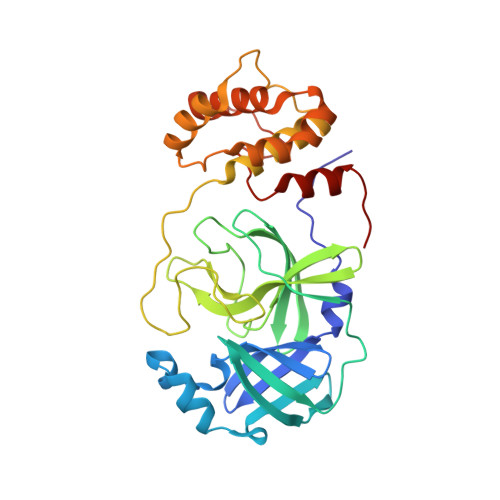Exploiting high-energy hydration sites for the discovery of potent peptide aldehyde inhibitors of the SARS-CoV-2 main protease with cellular antiviral activity.
Carney, D.W., Leffler, A.E., Bell, J.A., Chandrasinghe, A.S., Cheng, C., Chang, E., Dornford, A., Dougan, D.R., Frye, L.L., Grimes, M.E., Knehans, T., Knight, J.L., Komandla, M., Lane, W., Li, H., Newman, S.R., Phimister, K., Saikatendu, K.S., Silverstein, H., Vafaei, S.(2024) Bioorg Med Chem 103: 117577-117577
- PubMed: 38518735
- DOI: https://doi.org/10.1016/j.bmc.2023.117577
- Primary Citation of Related Structures:
8VQX, 8VSG - PubMed Abstract:
Small-molecule antivirals that prevent the replication of the SARS-CoV-2 virus by blocking the enzymatic activity of its main protease (Mpro) are and will be a tenet of pandemic preparedness. However, the peptidic nature of such compounds often precludes the design of compounds within favorable physical property ranges, limiting cellular activity. Here we describe the discovery of peptide aldehyde Mpro inhibitors with potent enzymatic and cellular antiviral activity. This structure-activity relationship (SAR) exploration was guided by the use of calculated hydration site thermodynamic maps (WaterMap) to drive potency via displacement of waters from high-energy sites. Thousands of diverse compounds were designed to target these high-energy hydration sites and then prioritized for synthesis by physics- and structure-based Free-Energy Perturbation (FEP+) simulations, which accurately predicted biochemical potencies. This approach ultimately led to the rapid discovery of lead compounds with unique SAR that exhibited potent enzymatic and cellular activity with excellent pan-coronavirus coverage.
Organizational Affiliation:
Takeda Development Center Americas, Inc, 9625 Towne Centre Drive, San Diego, CA 92121, United States. Electronic address: [email protected].


















